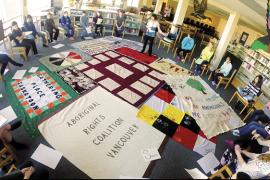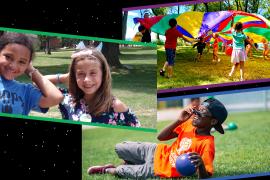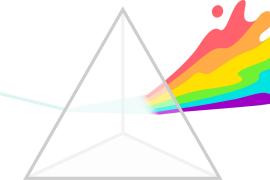When I was in kindergarten, we learned about contact between American settlers and Native Americans. As part of that project, we all created feathered headbands and smocks out of big paper bags. We pretended all day that way, my friends and I, running around the school, making up “Indian names” for each other, and doing lots of meaningless chanting.
I certainly look back on that memory and cringe. I’d guess many of you probably have similar stories about experiencing Indigenous culture in a simplified way, as a costume or caricature, without really learning about the thousands of communities that thrived in what are now the Americas before first contact. Many of those tribes still survive and thrive today.
As an adult I became a camp professional, most recently a camp director, working to end this type of cultural misuse at camp. In partnership with Camp Fire National HQ, we changed our camp’s name and acknowledged our painful history of “playing Indian.” I’ve since been inspired to help other camps do the same work. As a camp staff member this summer, you can learn to identify and advocate for the end of cultural appropriation at your camp.
General History and Definition
One thing to get comfortable with as you work to make camp a more inclusive and kinder place is telling the truth. Even when it feels intense or bold, truth-telling is kindness and key to moving forward. So here’s a truth we should all acknowledge: a fascination with and harmful misuse of Indigenous cultures is integral to the founding and history of summer camp. Really, it’s been a huge part of mainstream American culture too. You may remember a time (as I do) when you were asked to dress up as a Native American person to celebrate Thanksgiving. Or maybe you’re a fan of a sports team with a mascot or name modeled off Indigenous cultures. You may have gone to a camp or worked at camp with traditions, unit names, site names, or structures (totem poles, for example) that evoked and misused Native American culture. This type of appropriation is everywhere.
Cultural appropriation can be defined many ways, but this definition from We R Native is useful: “Cultural appropriation is when someone from the dominant culture (i.e., the most visible and accepted culture in a society) takes aspects of an oppressed culture (one experiencing any form of repeated or prolonged discrimination) without permission” (We R Native, 2023a). That said, it is a nuanced conversation that can often amount to an “I know it when I see it” feeling. We want to get better at recognizing those feelings, questioning them, doing some research, and stopping cultural appropriation before it happens.
To ground us in this work, we have to remember why. First, Indigenous people and culture still exist in the US. Cultural appropriation encourages everyone to see Indigenous people and culture as relics of the past, which is not just wrong, but it also harms Indigenous efforts for continued self-determination and rights.
Second, we know it is harmful to individuals. The American Psychological Association (APA) recommends the immediate ending of mascots, symbols, and appropriative imagery because they undermine both Indigenous people’s self-esteem and the educational experience of non-Native people (APA, n.d.).
Now that we know why this is the right thing to do, let’s talk about how to do it.
Learn Your Camp’s History
Learning more about your camp’s history can be helpful. Many longstanding camps have archives, historical documents scanned into online files, or displays with historical information. While digging through history, you may learn more about your camp’s misuse of Indigenous imagery or tradition. For example, when I did some research on our camp’s now-removed “totem pole,” I discovered that it was carved by non-Native campers in the 1960s, the pole was not using accurate symbology, and totem poles aren’t even a feature of the tribes in our camp’s region.
You may also learn of instances where Native Americans in your camp’s past “gave permission” for use of certain language or symbology. While this could indicate a positive relationship with Indigenous people in your camp’s history, you should still question the idea that this culture is your camp’s to use now. “Permission” from one person or small group does not indicate that the tradition is kind or thoughtful to continue. While you can acknowledge one person’s perspective, seek information from a variety of sources and look at the broader implications of each action.
Vague Context Can Be a Red Flag
Cultural appropriation often strips traditions, languages, and symbols of their full context. Vague explanations can indicate a cultural misuse and shouldn’t continue.
Historically, thousands of individual nations inhabited North America, and hundreds of Indigenous tribes are still recognized in the US (not to mention many unrecognized ones). Yet many arts and crafts activities — dreamcatchers come to mind — simply say they are “Native American” and give a vague description of their importance. In reality, dreamcatchers originated from the Anishinaabe and Ojibwe People of the Great Lakes region (We R Native, 2023b) and spread outside that culture during the Pan-Indian movement of the 1970s. Then the non-Native New Age movement of the 1980s quickly appropriated them. Many camp activities flatten out all that context. When you know the full story, it is clear that camps shouldn’t have been doing that in the first place.
The same can be true of names. Many camps, cabins, units, and dining halls have “Native American” names. But are they truly Indigenous? We discovered our camp’s name was completely made up to sound vaguely Native American. Regardless of origin, it’s worth asking — does your camp truly have claim over that language or name?
You will likely discover that with many camp traditions, activities, or names, the vague origin of the story attached to them can distort or leave out some of the history and context. This only causes further harm, continuing the myth that Native American people are relics of the past or homogenous in culture.
Ask Targeted Questions
For each activity that evokes Native American culture or symbology, asking lots of questions can help you uncover its full context and whether the activity should continue. Here are some questions to consider:
- Who originated this practice, name, clothing, or symbol? What specific tribe, nation, or culture does it come from? In many cases, it may be a non-Native-initiated “mash-up” of many practices.
- How is this practice, name, clothing, or symbol being used? Does it perpetuate stereotypes or harmful depictions? Do campers learn the full context?
- How do members of the culture being appropriated feel about the use of this practice, name, clothing, or symbol? While the larger conversation about cultural appropriation is well documented, through research you may be able to find information about a specific practice at your camp.
- What are the power dynamics at play? Is the group that is using the practice in a position of power over the group that originated the practice? The answer to this at camp is often yes, because most camps are run by non-Native people. As Indigenous people have faced systematic threats since first contact, non-Native people must recognize the harm that “playing” with Native culture can cause.
A note about partnership: If your camp doesn’t already have a partnership with local Native American tribes, seeking one may be a great step to take in the future. That said, if you feel strongly about the need to consult local Native tribes, I recommend that you voice this desire to your camp’s leadership, and conduct your own research to discover and make some needed changes before you attempt to create new partnerships. You shouldn’t rely on local tribes or tribal leadership for free consultation or permission to continue harmful practices. Instead, make an effort to change things you can already identify are harmful, and do your own work first.
Stop Appropriation
that you have a better sense of what to look for, as camp staff you can begin to untangle harmful misuse of Indigenous culture and stop it. Even if you don’t have formal decision-making power at your camp, you can start questioning, researching, and adjusting now.
Think Before You Act
Many camps have stories, traditions, and songs that are dear to their history. Or perhaps you learned a song in school or at another camp that you’d like to share with your new camp community. Before you start singing or telling a story, think carefully about what is being shared.
Does your story or song feature a vague “Chief” character who passes down wisdom? What about an “Indian Princess”? Does this song or story reinforce harmful stereotypes? As seasonal camp staff, you are well positioned to simply not sing that song or tell that story. Maybe it could be modified, or perhaps you pause for now and learn more first.
Form a Coalition
A group of staff interested in ending cultural appropriation at camp can spur positive change. This may already exist at your camp, or maybe you can start one. This group can be committed to simply learning more, asking questions when something feels off, and bringing ideas to camp leadership. You can also use this group to “call in” others through kind communication. Practice ways to say, “I don’t think we should sing this song — it seems to rely on stereotypes.” Saying the words out loud together will make you confident to address it when it comes up.
If needed, you can first ask questions about your camp’s traditions without changing them. Document what you discover, and share your findings with camp leadership. Taking time to write down what you find and how these traditions or names make community members feel can help you build a case to move away from cultural appropriation.
Acknowledge and Move toward a Growth Mindset
It can be challenging to make changes to these traditions, symbols, and names because alumni, campers, and staff have cherished memories and positive associations with them. This can bring up feelings of guilt, defensiveness, and shame.
Try framing the conversation around accountability and growth. Acknowledge the positive memories and experiences that people have had, but also recognize that these traditions have hurtful roots and impacts. Encourage people to take personal responsibility for the harm that has been done and to commit to learning and growing to create a more inclusive camp environment moving forward.
Replace Activities with More Appropriate Ones
There are appropriate ways to incorporate Indigenous knowledge into your camp program. For example, when learning about constellations, we began using curriculum created through collaboration between Ojibwe star watchers and NASA (NativeSkywatchers.org). In the program, we were able to share Ojibwe star stories, helping campers discover how different cultures have interpreted the same set of stars. This activity was designed for youth program use to deepen awareness of Native knowledge and tradition. The wisdom shared originates in a specific Nation, and it can be appropriately taught by non-Native instructors to supplement their constellation activities.
Tribal nations near your camp may have similar activities designed for non-Native teachers to use. Check out their websites and outreach information to find out more.
If the journey to remove cultural appropriation hasn’t begun at your summer camp home, I hope the information herein acts as a starting point for moving toward a more inclusive program that does not appropriate Indigenous cultures. Doing this work can help you create a more intentional, kind, and community-driven camp. It is a great opportunity to learn and grow — and it isn’t that what camp is all about?
References
- American Psychological Association. (n.d.). APA resolution recommending the immediate retirement of American Indian mascots, symbols, images, and personalities by schools, colleges, universities, athletic teams, and organizations. apa.org/about/policy/mascots.pdf
- NativeSkywatchers.org. (2020, October 23). Two-eyed seeing: Ojibwe astronomy & NASA moon to Mars. nativeskywatchers.com/articles/Booklet-Ojibwe-10-23-20-v9-screen-version.pdf)
- We R Native. (2023a). Native cultural appropriation. wernative.org/articles/native-cultural-appropriation
- W R Native. (2023b). Ojibwe dreamcatcher legend. wernative.org/articles/ojibwe-dreamcatcher-legend
HK Gilbert is an accreditation manager for the American Camp Association’s Western Region.



